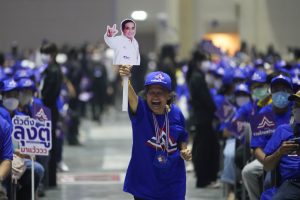With the approach of the general elections in Thailand — they are scheduled for early May — the country’s political parties are unveiling a new set of policy platforms. Although public policies have played an increasing role in Thai politics since the 1990s, the power of factional politics is still predominant, particularly in local constituencies. Politicians and faction members switch parties frequently, hoping to win elections and gain access to more resources. Major parties try to persuade strong factions to join to ensure their victory. This year’s election is likely to be no different, and we can expect to see old-style factional politics continue to dominate the electoral landscape at the expense of party institutionalization and policy platform-based competition.
Since December of last year, Thailand’s political parties have announced a variety of new policies to attract votes. Most of these have been broadly similar, drawing on populist appeals of one kind or another. These include welfare policies subsidizing the older generation, benefits for mothers and children, and funds supporting the agricultural sector. However, Parties differ in how they are targeting voters. For example, while the opposition Pheu Thai Party promises to raise the minimum daily wage to 600 baht, the ruling Palang Pracharath Party (PPRP) has vowed to increase state welfare scheme benefits to 700 baht per month for people who earn less than 100,000 baht ($2,800) a year if returned to power after the election.
While Chart Pattana Kla, led by former Finance Minister Korn Chatikavanij, has proposed a tax reform wherein people earning a monthly income of 40,000 baht or less would enjoy an income tax cut, Pheu Thai promises workers with a bachelor’s degree will receive a minimum monthly salary of 25,000 baht. Additionally, all major parties are promising that Thais who are over 60 years old will receive a retirement fund of approximately 3,000 baht per month. Policies providing maternity benefits are also included in all major party policy platforms, providing approximately 10,000 baht for pregnant women and also 3,000 baht every month for their child from pregnancy until the age of six.
Aside from these welfare policies, parties have introduced additional policies for the poor. The Bhumjaithai Party, for example, is campaigning on a policy to suspend debt repayments for three years. Thai Sang Thai, which is led by Sudarat Keyuraphan, is offering people emergency cash payments of between 5,000 and 50,000 baht. The newly formed United Thai Nation Party (UTNP), which has 2014 coup leader and incumbent Prime Minister Prayut Chan-o-cha as its premier candidate, announced a campaign to increase benefits for welfare cardholders from 200-300 baht to 1,000 baht per month.
These policies have been broadly criticized by scholars and technocrats, who argue that populist policies threaten to increase Thailand’s financial burdens while failing to enhance the country’s economic development. Critics also claim that such policies create negative incentives for the poor to rely on government handouts rather than create positive incentives for self-reliance.
Although parties do propose policies to attract votes, in practice these policies do not ensure electoral victory. The Thai electorate is often directed by groups of politicians and influential individuals, called factions, that control votes in particular regions or provinces. Major parties seek to attract and retain the support of these factions to win elections. Beginning in January of this year, we have seen many major factions shifting alliances and being courted by parties for the upcoming election.
According to the 2017 organic law on political parties, candidates are required to be party members for at least 90 days before election day or at least 30 days if the parliament is dissolved before the end of the government’s term. In recent weeks, multiple factions have switched allegiances in preparation for the election, including a significant number from the ruling PPRP party. Among major parties, PPRP and the Democrat Party have lost the most factions to other political parties, including Bhumjaithai, UTNP, and Pheu Thai.
The recent introduction of new electoral rules has forced parties to focus on winning district seats, due to an increase in the number of single-member constituency seats using the first-past-the-post voting system from 350 to 400. This also reduced the number of party-list seats using a proportional representation system from 150 to 100. District seats are more closely tied to the influence of factions than party list seats, meaning that this change in electoral rules potentially strengthens regional and provincial factions. Patronage systems link influential factions to voters, meaning they are key to elections in particular constituencies.
Factions decide to move to new parties for multiple reasons, including money, internal party conflicts, and a decline in the popularity of their current party. Some factions receive money from other political parties in exchange for shifting their allegiance. Informants familiar with well-known political factions have told this author that a faction can earn up to 80 million baht (roughly $2 million) by switching parties. Other factions defect to new parties due to conflicts with party leaders or other factions over the distribution of cabinet seats or other political issues.
Hence, in the May election, policy platforms may be less important than the role of factions, particularly in local constituencies. Major parties are competing for powerful factions that hold sway over particular regions and provinces. This, however, does not suggest that parties can forgo campaigning on policies altogether. For party-list seats, in particular, policies remain important, and all the more so for urban voters in Bangkok and large cities across the country. Thus, parties must both formulate a strong policy platform as well as cultivate a network of factions to achieve electoral victory.

































